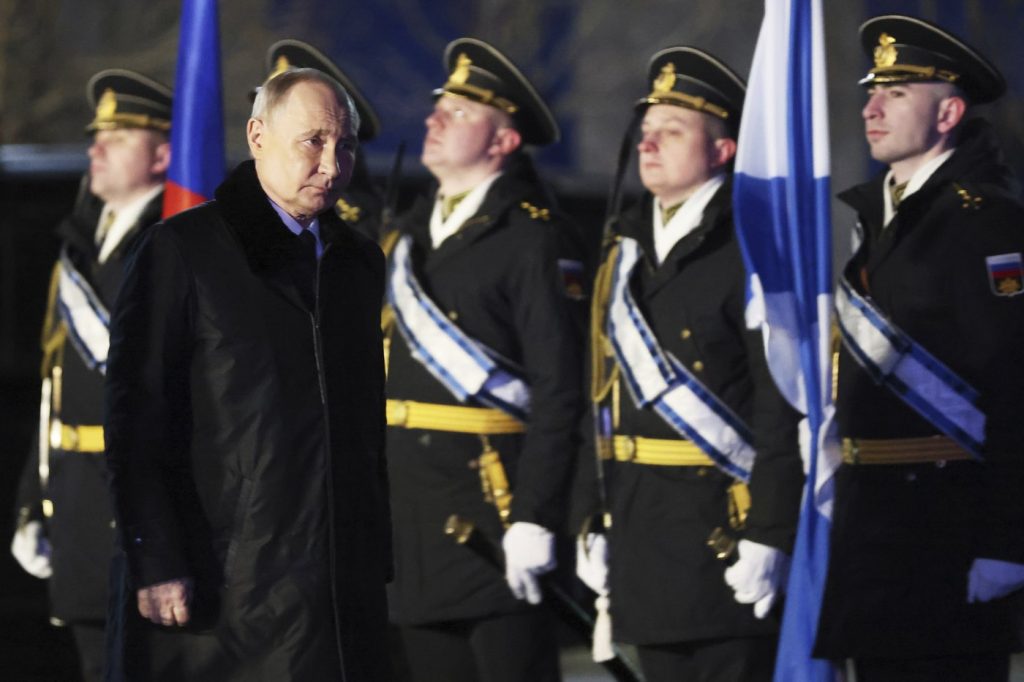Russian President Vladimir Putin made a bold proposal on Friday, suggesting that Ukraine be placed under external governance with United Nations oversight as part of efforts to achieve a peaceful resolution to the ongoing conflict. His comments, delivered to crew members aboard a Russian nuclear submarine, emphasized his view that Ukrainian President Volodymyr Zelenskyy, whose term expired last year, lacks the legitimacy to negotiate a peace agreement.
Putin argued that any treaty signed by the current Ukrainian leadership could be deemed invalid by future governments. He pointed out that national elections cannot occur under Ukraine's constitutional martial law, implying that new elections could be facilitated under external governance. “Under the auspices of the United Nations, with the United States, even with European countries, and, of course, with our partners and friends, we could discuss the possibility of the introduction of temporary governance in Ukraine,” Putin stated. He added that this arrangement would enable Ukraine to conduct democratic elections, leading to the formation of a government that would be acceptable to the populace, thus opening the door for peace negotiations.
Putin's remarks followed a summit hosted by French President Emmanuel Macron, where discussions included plans to deploy peacekeeping troops to Ukraine to solidify a future peace agreement. Macron indicated that "several" other nations are interested in joining France and Britain in this effort. In contrast, Russia has warned against the involvement of troops from NATO member states in any peacekeeping operations.
The French summit participants accused Russia of merely pretending to seek a negotiated settlement, with U.K. Prime Minister Keir Starmer asserting, “They are playing games and they’re playing for time.” This sentiment highlights the skepticism surrounding Russia's commitment to peace, particularly in light of accusations of ongoing military aggression.
Russia and Ukraine recently agreed to a tentative U.S.-brokered deal intended to pause strikes on energy infrastructure, but both countries quickly accused each other of violations. This resulted in difficulties in formalizing a broader peace agreement. Late on Thursday, the Russian military launched 163 strike and decoy drones at Ukraine, according to reports from the Ukrainian air force, which revealed that 89 of these drones were successfully intercepted. The drone strikes led to significant damage to residential buildings, particularly in Zaporizhzhia, and caused injuries to civilians.
On the flip side, the Russian Defense Ministry reported that Ukrainian forces had attacked a gas metering station in the Kursk region, destroying the facility, and claimed another strike hit an energy installation in Bryansk, leading to a power outage. The ministry accused Ukrainian forces of violating agreements aimed at halting strikes on energy facilities, describing Kyiv's actions as a ruse designed to forestall defense collapse while regaining military capabilities through Western support.
While Ukraine reportedly agreed to a potential full 30-day ceasefire as suggested by former President Trump, Putin has emphasized that a comprehensive truce depends on halting arms supplies to Ukraine and suspending its military mobilization. He stated that the Russian military is “gaining steam” and continuing offensives along the entire front line, claiming progress in liberating territories and maintaining strategic initiative. In his comments, Putin reiterated the necessity of addressing the “root causes” of the conflict for a lasting peace.
His demands include the withdrawal of Ukrainian forces from the four regions partially occupied by Russia, a renunciation of Ukraine’s aspirations to join NATO, sharp reductions to its military capabilities, and the protection of the Russian language and culture within Ukraine to ensure the country remains aligned with Moscow.
Additionally, Russian officials have indicated that any future peace agreement would need to include the unfreezing of Russian assets held in the West and the lifting of sanctions imposed by the United States and the European Union. The Trump administration has expressed a willingness to consider sanctions relief under certain conditions.











